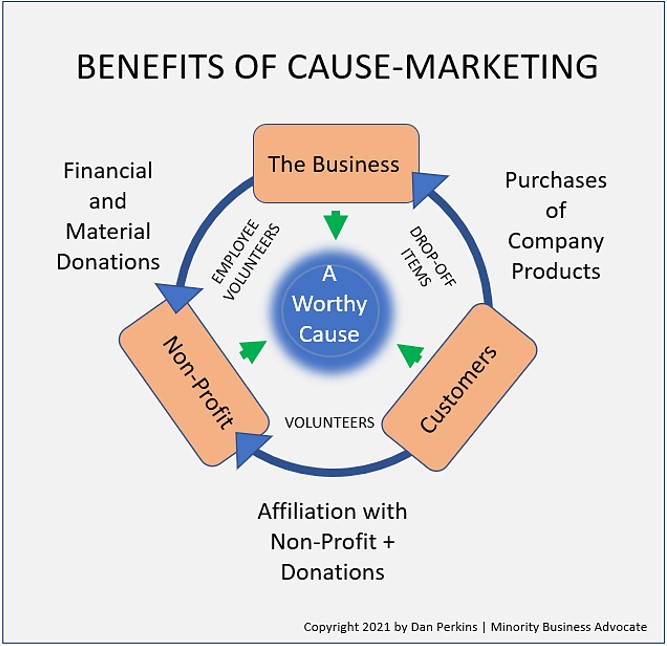News and Information
Consider Growing Your Business with Cause-Marketing
When given a choice, consumers prefer purchasing from companies they view as socially responsible.

July's Business Tip
As our region slowly moves beyond the gripping effects of the Covid-19 pandemic, business owners are looking for new ways to connect with consumers. Some are considering “Cause-Related-Marketing,” also known as “Cause-Marketing,” to reconnect with old customers and make connections with new ones. If you are unfamiliar with either term, then this article is for you.
Cause-Marketing is a specific type of marketing that aligns a business, its products or services, with a cause that resonates with existing or potential customers. This article is intended to help business owners evaluate the potential benefits of Cause-Marketing as a tool to attract more business in a post-Covid economy.
The notion of Cause-Marketing began to take hold across the national landscape when business owners and marketers noticed that, when given a choice, consumers tend to prefer purchasing products and services from companies they regard as socially and environmentally responsible.
In recent years, companies have begun partnering with non-profit organizations to raise funds for specific causes that address a wide-range of conditions, from animal care and preservation to environmental initiatives to health-related concerns, and more. Cause-Marketing is now so popular that one source identified it as the primary means by which companies now demonstrate social responsibility.
How to Make Cause-Marketing Work for Your Business
When structured properly, Cause-Marketing campaigns deliver clear benefits to all parties involved, as well as to the cause. See diagram below.

When a business chooses to engage in Cause-Marketing, it typically positions itself, or its products and services, with a non-profit that is addressing a notable concern. Customers are motivated to purchase products or services because the purchases contribute, in some way, to the mission of the non-profit. In turn, the non-profit, which is focused on addressing a notable concern (or cause), gains new sources of revenues and material assistance. The alignment between the business and the non-profit is the key element of Cause-Marketing. The business pledges to support the non-profit by donating money, encouraging employees to volunteer their services, or by partnering, in some clever way, with the non-profit organization that customers and employees find attractive. The third element in the equation is customers, new and existing. Cause-Marketing provides customers with the knowledge that their purchases not only satisfy a want or need, but also contribute, directly or indirectly, to a notable cause.
Cause-Marketing has proven to be a successful business strategy because it enables customers to address a needful situation or worthy cause in a way that is both easy and gratifying. The key to achieving success through Cause-Marketing is the alignment between the business, the cause, and the non-profit addressing the cause. At some level, both the cause and non-profit need to reflect or align with the values of the business entity, even if the business has a completely different mission.
A personal beauty company might align with a non-profit that is promoting mental health among women. The alignment here is fairly obvious. Most beauty items are purchased by women; therefore, aligning the business with a non-profit that cares about women’s mental health is a way for the business to inform its leading customer base of its concern for their well-being, beyond physical beauty.
Now, consider a more ambiguous alignment. Dairy products are primarily viewed as wholesome, healthy, and family friendly. It might not be helpful for a dairy products company to launch a Cause-Marketing campaign that aligns it with a non-profit organization promoting responsible use of guns and weapons. While the non-profit is involved in an important and worthy cause, guns and dairy do not align in the minds of most dairy consumers.
On the other hand, some milk companies have a longstanding practice of printing information about missing children on their milk cartons. Children and milk go together.
Frequently, smaller companies will select a campaign that centers on a key interest of the business owner. In the Chicago area, a local auto dealership famously created television spots featuring the business owner and his dog. When the business owner’s son took over the business, he launched a campaign that aligned the dealership with a non-profit dog shelter. A portion of the sale or lease of vehicles from that dealership now goes to the dog shelter. The campaign is a clever way to honor the founder’s fondness for dogs, while encouraging like-minded consumers to purchase or lease their next vehicle at the dealership. The cause-related campaign resonates with potential buyers who want to help dogs in need.
Business owners may be able to avoid some unintended consequences associated with a Cause-Marketing campaign by considering the impact the cause might have on employees. A poorly conceived and executed campaign can strain relations with employees and hamper efforts to attract new talent. For example, a woman-owned business that has a sizable female workforce might strengthen its connection with employees by adopting a cause that matters to women and families. However, if the owner of that business were a gun enthusiast, and decided to align with a non-profit that supports responsible gun use, that decision might potentially turn-off employees and consumers, particularly those who oppose the proliferation of guns in society, in any form or level.
As with every decision, and every tool, there are benefits and potential pitfalls associated with its deployment. Cause-Marketing is no exception. Companies considering such campaigns may be able to avoid some unforeseen situations by retaining a marketing firm with extensive experience developing Cause-Marketing campaigns involving related products and customers. A competent marketing firm will help ensure proper alignment of all parties and interests with a given campaign.
The Maywood Chamber of Commerce wishes its members success in growing their businesses and in adopting causes that help make the world a better and kinder place.
M A Y W O O D
The Maywood Chamber of Commerce is Committed to the Success of Businesses in Maywood, Illinois.

Come Join Us
I L L I N O I S
TODAY
Ready to Become a Member?
If you have questions, or would like to speak with someone, please contact our president, Mr. Edwin Walker.
(708) 345-7077
(708) 345-9455 (Fax)
Email: contact@maywood-il-mcc.com
